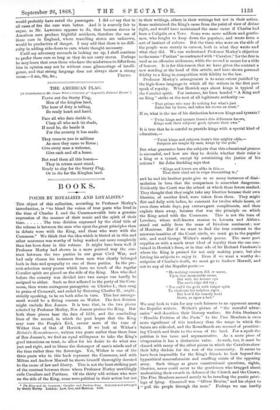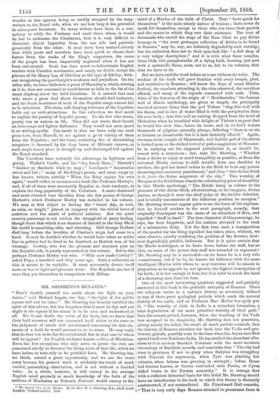BOOKS.
POEMS BY ROYALISTS AND LOYALISTS.*
THE object of this collection, according to Professor Morley's introduction, is "to blend the voices of true poets who lived in the time of Charles I. and the Commonwealth into a genuine expression of the manner of their music and the spirit of their time The true division expressed by the chief title of the volume is between the men who upon the great principles then in debate were with the King, and those who were with the Commons." We think that the idea which is hinted at in this and other sentences was worthy of being worked out more completely than has been done in this volume. It might have been well if Professor Morley had shown in a more pointed way the con- trast between the two parties in our great Civil War, and had only chosen his instances from men who clearly belonged both in date and sympathy to one of those parties. In the pre- sent selection many poems which have no touch of the regular Cavalier spirit are placed on the side of the King. Men who died before the country was divided into two camps can hardly be assigned to either. Such as first adhered to the party of the Com- mons, then wrote outrageous panegyrics on Charles I., then sang in praise of Cromwell, and ended by flattering Charles IL, ought, strictly speaking, to be on both sides in turn. This last arrange- merit would be a fitting censure on Waller. The first division might exclude Ben Jonson. It is true that, in the two pieces salectel by Professor Morley, am Jenson praises the King. But both these pieces bear the date of 1630, and the concluding lines of the second, in which the poet hopes that the King may cure the People's Evil, savour more of the tone of Wither than of that of Herrick. If we look at Wither's Britain's Remembrancer, written two years earlier than these lines of Ben Jenson's, we find an equal willingness to take the King's good intentions on trust, to allow for his desire to do what was just and right, and to blame the distemper of men's minds and of the time rather than the Sovereign. Yet, Wither is one of the three poets who in this book represent the Commons, and with Milton and Andrew Marvell he shows himself thoroughly devoted to the cause of law and liberty. This is not the least striking part of the contrast between those whom Professor Morley unwillingly calls Cavaliers and Puritans. Of the thirty odd writers who were on the side of the King, some were political in their action but not • The King and the Commons: Cavalier and Puritan Song. Selected and arranged by Henry Morley. London: Low, Son, and Marston. IVA in their writings, others in their writings but not in their action. Some maintained the King's cause from the point of view of divine right, and would have maintained the same cause if Charles had been a Caligula or a Nero. Some were mere soldiers and gentle- men, who fought to keep down the populace, and wrote front a sort of instinct of culture. But the three who were on the side of the people were sternly in earnest, both in what they wrote and what they did. We can understand Professor Morley's objection to the name "Puritan" as contrasted with " Cavalier ;" for the first is used as an offensive nickname, while the second is meant for a title of honour. It is for this reason that we have given the contrast a new wording at the head of this article, and have shown personal fidelity to a King in competition with fidelity to the law.
Professor Morley's arrangement is to some extent justified by the high-flown language in which all the writers in the first part speak of royalty. What Herrick says about kings is typical of the Cavalier spirit. For instance, his lines headed "A King and no King" strike at the root of all legitimate authority :—
" That prince who may do nothing but what's just Rules but by leave, and takes his crown on trust."
If so, what is the use of his distinction between kings and tyrants ?
"'Twist kings and tyrants there's this difference known, Kings seek their subjects' good, tyrants their own."
It is true that he is careful to provide kings with a special kind of education,—
"'Twixt kings and subjects there's this mighty odds,— Subjects are taught by men, kings by the gods."
But what guarantee have the subjects that this educational proces& is successful, and how are they to decide whether their ruler is a king or a tyrant, except by scrutinizing the justice of his actions ? Sir John Suckling says that
"Kings and lovers are alike in this,—
That their chief art in reign dissembling is ;"
and he and his brother poets give us so many instances of dissi- mulation in love that the comparison is somewhat dangerous. Evidently the Court was the school at which these lovers studied.. They thought that they might take any liberties because their own liberties, of another kind, were taken from them. They might flirt and daily with ladies, be constant for twelve whole hours, or- even three whole days, pay extrava gent compliments, and then explain them away, because that was the principle on which the King acted with the Commons. This is not the tone of Lovelace, whose well-known stanzas to Lucasta and Aitken- stand out nobly from the mass of frivolous sentiment ; nor of Montrose. But if we want to find the true contrast to the amorous inanities of the Court circle, we must go to the popular side, and read George Wither's manly poems. The same poet. supplies us with a much truer ideal of royalty than the one con- tained in Herrick's lines, or in that ode of Sir Richard Fanshawe's where the King is praised for not only making peace, but also forcing his subjects to enjoy it. liven if we want a worthy de- scription of Charles's death, we must go to Andrew Marvell, and not to any of the Royalist poets :— "Ho nothing common did, or mean, Upon that memorable scene, But with his keener eye The axe's edge did try ;
"Nor call'd the gods with vulgar spite To vindicate his helpless right, But bow'd his comely head Down, as upon a bed."
We may look in vain for any such fairness to an opponent among the Royalist writers. Wither's phrase of " the scornful adver- saries" well describes their literary warfare. Sir John Denham's " Humble Petition of the Poets" to the Five Members is even more significant of this tendency than the songs in which the- Saints are ridiculed, and the Roundheads are accused of prostitut- ing Church and State to the scum of the laud. For a squib the petition is too tame and argumentative. As a mere piece of vituperation it has a distinctive value. As such, too, it must be classed with many of the other pieces in which the Cavaliers show their lofty disdain for the rest of the community. It seems to- have been impossible for the King's friends to look beyond the hypocritical nonconformists and snuffling saints of the opposing army. Such things as grave constitutional questions, rights, liberties, never could occur to the gentlemen who bragged about- unsheathing their swords in defence of the Church and the Crown. The Five Members seemed merely to be invading the poetic privi- lege of lying. Cromwell was "Oliver Brutus," and his object to "gull the people through the nose." Perhaps we can hardly wonder at this opinion being so readily accepted by the song- writers on the Royal side, when we see how long it has prevailed in subsequent literature. So many writers have been in a con- spiracy to vilify the Puritans and exalt those whom it would be fair to nickname the Charlatans, that it is very difficult to dissociate abject hypocrisy from the one side and patriotic generosity from the other. It must have been noticed already that while poets and novelists have been quick to choose their heroes from the ranks of the King's supporters, the cause of the people has been impartially neglected when it has not been caricatured. Scott has done much to indoctrinate English readers with Cavalier sentiments, and many, no doubt, accept his picture of Sir Henry Lee of Ditchley as the type of fidelity, with- -out recognizing the good knight's weakness and prejudices. On the other side, we have little save a poem of Macaulay's, which, stirring as it is, does not command so much favour as falls to the lot of the -usual claptrap about the bold Cavaliers. It is natural that men who wrote a great deal about themselves should find imitators, and the frank heartiness of most of the Royalist songs cannot fail to be infectious. The stern, self-denying reticence of the Loyalists holds out no such attractions. In this collection we find much to explain the paucity of Loyalist poems. To the few who wrote, poetry was as serious as life. They did not waste their breath on love-songs and lighter dalliances. They would not even spend it on writing squibs. The result is that we have only one such piece here, from Marvell, to set against a gr at variety of them from the Royalists ; and the loose, scattering fire of skirmishing songsters is drowned by the deep boom of Miltonic cannon, as .each single heavy piece is brought up and discharged full against the Royal standard.
The Cavaliers have certainly the advantage in lightness and gaiety. 'Walter's Girdle, and his "Go, lovely Rose ; " Herrick's "Gather ye rosebuds while ye may ; " Lovelace's " Amarantha -sweet and fair ; " many of Suckling's poems, and some songs by less known writers, notably " When the King enjoys his own -again," would suffice to recommend a book like Professor Morley's, and, if all of them were necessarily Royalist in their tendency, to explain the long popularity of the Cavaliers. A more chastened and more elevated tone breathes from the few poems of George Herbert's which Professor Morley has included in his volume. We may at first object to having the "Sweet day, so cool, so calm, so bright," placed in company with the trivial loves of oonrtiers and the snarls of political satirists. But the quiet -country parsonage is not seldom the stronghold of party feeling, though there that which is an element of discord in the busy life of the world is something calm and elevating. Still George Herbert died long before the troubles of Charles's reign had come to a head. It may be doubted whether he would have taken an active line in politics had he lived to be deprived, as Herrick was, of his vicarage. Cowley, who was the greatest and sincerest poet on the Royalist side, is poorly represented in this volume. But in this perhaps Professor Morley was wise. "Who now reads Cowley?" asked Pope, a hundred and fifty years ago. Such a collection as this is meant to be readable. It must necessarily devote itself more or less to light and pleasant verse. The Royalists are lost if -once they put themselves in comparison with Milton.































 Previous page
Previous page